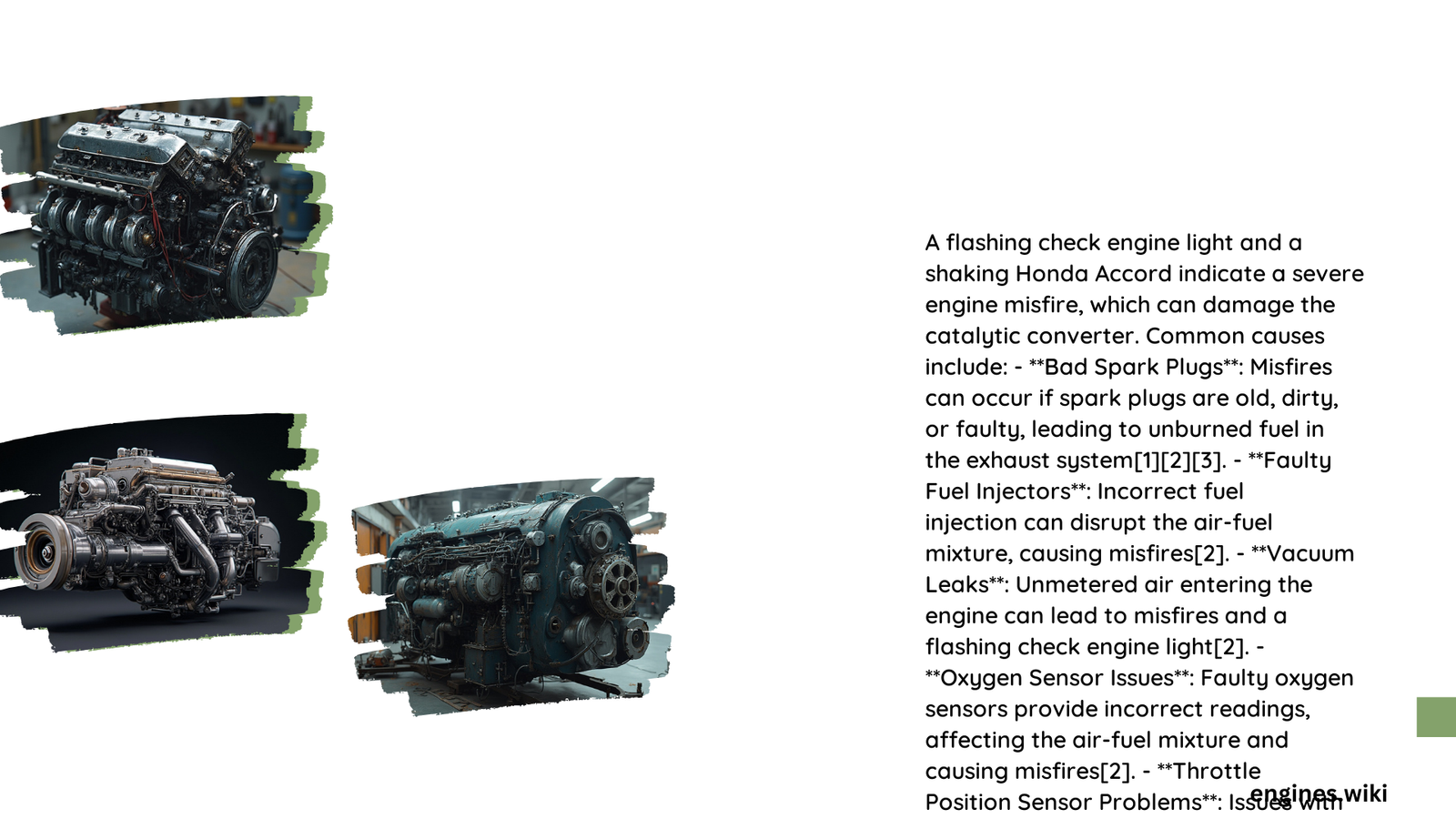A flashing check engine light and car shaking in a Honda Accord typically indicate a severe engine misfire. This issue can lead to potential damage to the catalytic converter due to unburned fuel entering the exhaust system. Common causes include spark plug problems, ignition coil failures, and fuel injection system malfunctions. Immediate attention is crucial to prevent further damage and ensure safe vehicle operation.
What Are the Main Causes of a Flashing Check Engine Light in a Honda Accord?
The primary causes of a flashing check engine light in a Honda Accord include:
- Spark Plug Issues: Worn, fouled, or damaged spark plugs can cause misfires.
- Ignition Coil Failures: Faulty ignition coils prevent proper spark generation.
- Fuel Injection Problems: Malfunctioning fuel injectors can lead to improper fuel mixture.
- Vacuum Leaks: Air leaks in the intake system can disrupt the air-fuel ratio.
- Faulty Sensors: Malfunctioning oxygen or mass airflow sensors can cause misfires.
How Does a Misfire Affect Honda Accord Performance?

A misfire in a Honda Accord can significantly impact vehicle performance:
- Engine Shaking: The car may vibrate noticeably, especially at idle or during acceleration.
- Power Loss: Reduced engine power, particularly when accelerating or climbing hills.
- Rough Idle: The engine may run unevenly when the car is stationary.
- Increased Fuel Consumption: Misfires can lead to poor fuel economy.
- Exhaust Odor: A strong smell of unburned fuel from the exhaust.
What Are the Immediate Steps to Take When Experiencing This Issue?
If your Honda Accord’s check engine light is flashing and the car is shaking, follow these steps:
- Reduce Speed: Slow down and avoid sudden accelerations.
- Find a Safe Place: Pull over to a safe location as soon as possible.
- Turn Off the Engine: Shut down the engine to prevent potential damage.
- Seek Professional Help: Contact a qualified mechanic or Honda dealership.
- Avoid Prolonged Driving: If possible, have the car towed to a repair facility.
How Can You Diagnose the Problem at Home?
While professional diagnosis is recommended, here are some steps you can take at home:
- Use an OBD-II Scanner: Connect a scanner to read error codes.
- Check Spark Plugs: Inspect spark plugs for wear or damage.
- Examine Ignition Coils: Look for visible damage or loose connections.
- Listen for Unusual Sounds: Pay attention to any ticking or hissing noises.
- Inspect Fuel System: Check for fuel leaks or damaged fuel lines.
What Are the Potential Repair Costs for This Issue?
Repair costs can vary depending on the underlying cause:
| Repair | Estimated Cost Range |
|---|---|
| Spark Plug Replacement | $100 – $250 |
| Ignition Coil Replacement | $150 – $400 |
| Fuel Injector Cleaning | $50 – $150 |
| Oxygen Sensor Replacement | $200 – $500 |
| Catalytic Converter Replacement | $1000 – $2500 |
How Can You Prevent Future Occurrences of This Problem?
To minimize the risk of future misfires and check engine light issues:
- Regular Maintenance: Follow Honda’s recommended maintenance schedule.
- Use Quality Parts: Install OEM or high-quality aftermarket components.
- Address Issues Promptly: Don’t ignore minor performance problems.
- Use Proper Fuel: Use the recommended octane rating for your Accord.
- Keep Engine Clean: Regularly clean the engine bay to prevent debris buildup.
What Are the Long-Term Consequences of Ignoring This Issue?
Ignoring a flashing check engine light and car shaking in your Honda Accord can lead to:
- Catalytic Converter Damage: Expensive to replace and crucial for emissions control.
- Engine Damage: Prolonged misfires can cause internal engine damage.
- Increased Emissions: Failed emissions tests and environmental impact.
- Reduced Fuel Efficiency: Persistent poor fuel economy.
- Safety Risks: Potential for stalling or loss of power in critical situations.
How Does Honda’s Warranty Cover This Type of Problem?
Honda’s warranty coverage for misfires and related issues:
- New Vehicle Limited Warranty: Covers most components for 3 years/36,000 miles.
- Powertrain Warranty: Extends to 5 years/60,000 miles for engine components.
- Emissions Control Systems: Specific coverage for emissions-related parts.
- Certified Pre-Owned Vehicles: May have extended warranty coverage.
- Aftermarket Parts: Using non-Honda parts may void warranty for related components.
Always consult your specific warranty documentation or a Honda dealer for exact coverage details.
What Are Some Common Misdiagnoses for This Issue?
Misdiagnoses can lead to unnecessary repairs. Common misdiagnoses include:
- Assuming It’s Always Spark Plugs: While common, it’s not the only cause.
- Overlooking Fuel System Issues: Fuel-related problems can mimic ignition issues.
- Ignoring Sensor Data: Faulty sensors can cause similar symptoms.
- Misinterpreting Error Codes: Some codes may be symptoms, not root causes.
- Neglecting Mechanical Problems: Internal engine issues can cause misfires.
Always seek a thorough diagnosis from a qualified technician to avoid costly mistakes.
By understanding the causes, symptoms, and solutions for a flashing check engine light and car shaking in your Honda Accord, you can take prompt action to protect your vehicle and ensure safe, efficient operation.
References:
1. Honda Accord Check Engine Light in Atlanta
2. How to Fix a Flashing Check Engine Light
3. Check engine light flashing – Honda Accord Questions
